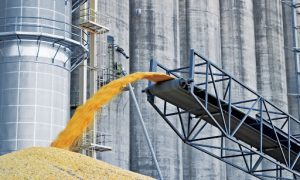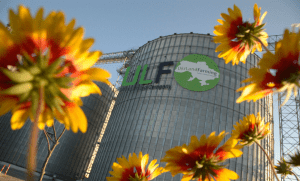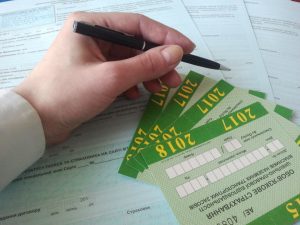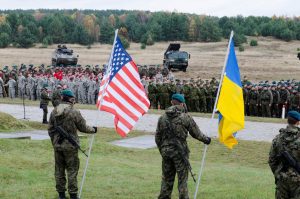
The State Property Fund (SPF) of Ukraine has put up for auction on May 7 with an initial price of UAH 187.64 million a single property complex of the state-owned enterprise Dunaivtsi grain processing factory (Dunaivtsi village, Khmelnytsky region), which will become the first privatized state asset in the grain processing industry, the fund said on its website on Wednesday.
According to the fund, earlier, such plants were one of the key links in the agricultural monopoly controlled by the state, but with the transition to a free market, this asset became non-core for the state.
The SPF noted that most of the plants cannot be called successful, but these assets have excellent investment potential, since they were created as production sites in profitable locations and with a developed logistics infrastructure. The enterprises have powerful elevators and access to railways, as well as developed capacities for storage or transshipment of products.
The fund said that the privatization of grain processing factories is beneficial for all participants in the process: the state fills the budget and receives a revival of economic activity, investors – assets important for business development, and local communities – jobs and development of territories.
Dunaivtsi grain processing factory is engaged in the production of products of the flour and cereal industry and feed for animals kept on farms, wholesale trade in grain, unprocessed tobacco, seeds and animal feed.
The fund noted that the asset consists of buildings and structures with a total area of 79,800 square meters, including an administrative building, a canteen, bakeries, elevators, a mill, a laboratory, warehouses, workshops, garages and other outbuildings. The total area of the enterprise’s land plots is 67.3 hectares, on which there is the necessary technological equipment and communications: water supply, electricity, sewerage and access roads.
The plant in 2020 reduced its net profit by 14.2% compared to 2019, to UAH 2.26 million, its assets increased 2.4 times, to UAH 193.66 million, and total accounts receivable decreased by 16.9%, to UAH 20.24 million.

Due to a shortage of working capital caused by pressure from law enforcement agencies, the agricultural holding Ukrlandfarming has reduced the livestock population from 52,000 to 15,700, the owner of the agricultural holding Oleh Bakhmatiuk has said.
“It also requires working capital, which, unfortunately, we do not have, because credit lines are being closed. Let’s be reasonable, it is unlikely that animal husbandry will recover,” he said in an interview with Interfax-Ukraine. Bakhmatiuk said that the number of employees in animal husbandry decreased by 7,000, while in the Avangard sub-holding, which produces eggs and egg products by 5,500.
“At the peak there were 32,200 [employees], and now it is 17,300-17,500. For a year and a half, we laid off about 13,000-13,500 people in two main areas – poultry farming and animal husbandry, because they needed borrowing. This situation was due to the reputational terror that has been waged against the company and personally me as a shareholder over the past year and a half,” the businessman said.
He said that Ukrlandfarming is trying to preserve the agricultural business, in particular, the land bank, after previously falling by 170,000 hectares, has recently stabilized at about 470,000-475,000 hectares: almost 200,000 lease agreements and 600 near settlements.
“Now we must sow, carry out the sowing campaign correctly, with no crediting at all. We have prepared for this. It is twice as difficult for us as for everyone, but we will try to pass it,” Bakhmatiuk said.
According to him, the company failed to take advantage of the rise in prices for grain and corn, because it had to sell goods quickly due to lack of working capital.
The owner of the agricultural holding said that he would try to keep the company at its current size, but if pressure continues, it is likely that it will continue to decline. “Any defense, eventually, retreats. Even if not so sharply, but if in a year and a half we lost 35% of the company, then, for sure, this year we can lose another 15% or 10%,” he said.
Bakhmatiuk said that he remains in dialogue with creditors. However, the latter negatively perceive the events around the company. “They do not support me out of great love, probably. If to take it reasonably, they do it forcibly. But they understand that if there is a loss of the company, then there will be total losses for them. I am fighting for my own, and for them,” the businessman said.
According to him, the conversion of debt into shares in this situation will not fundamentally solve the problem. “The question is not about the shareholders. They are, in fact, shareholders at the expense of loans… It is not a problem with the share capital. But the problem is that an agricultural enterprise cannot live without borrowing, because you have a cycle of six to eight months,” Bakhmatiuk said.
In his opinion, creditors will so far refrain from filing a lawsuit against the company, as this will entail a “domino effect” and the loss of 95% of invested resources. “While these constraining factors are important for them, I maintain some kind of dialog with them. But the arguments are getting smaller. You perfectly understand that the time frame is not eternal: in six months or a year the issue must be resolved,” the businessman said.
He said that Ukraine today is in the “agrarian trend” and has good opportunities to increase the export of raw materials in the coming years.

Ukrainian insurance companies in 2020 collected UAH 215.3 million of premiums under insurance contracts concluded through resident brokers, which is 24.3% more compared to 2019 (UAH 169.1 million).
According to the website of the National Bank of Ukraine (NBU), during this period 10,747 contracts were concluded through resident brokers, while in the same period a year earlier, according to the former regulator of the National Commission for Financial Service Markets Regulation it was 24,724.
The amount of remuneration for the provision of such intermediary services for the specified period decreased 28.8%, to UAH 20.02 million.
Reinsurance payments received by resident insurers under 166 contracts amounted to UAH 30.747 million, while a year earlier under 128 contracts it was UAH 12.660 million.
According to the NBU, nonresident reinsurers through brokers received UAH 1.085 billion for reinsurance under 244 contracts, while in the previous year it was UAH 920.7 million under 258 contracts.
Insurance payments compensated by nonresident reinsurers for the reporting period amounted to UAH 422.519 million, which is 2.9 times more.
The NBU does not provide indicators of remuneration for brokers for the reporting period; at the end of 2019, they amounted to UAH 34.619 million.

Ukrainian specialists will take part in the NATO mission in Iraq and the Maritime Guard operation in the Mediterranean sea, said Yuriy Vasyliev, deputy director of the department, head of the European and Euro-Atlantic integration department of the International Defense Cooperation Department of the Ukrainian Defense Ministry. “Ukraine has been a contributor to international security throughout its years of independence, and we continue, despite the aggression that we have, our contributions to missions and operations under NATO command. Now we have specialists who are in a Resolute Support Mission in Afghanistan and in the forces in Kosovo. But taking into account our recent proposals that have been accepted, we are now preparing to send our specialists to another two operations: the NATO mission in Iraq and the Alliance’s operation Maritime Guard,” Vasyliev said at an online conference on Tuesday.
He stressed that the Ukrainian military, hardened in battles to defend independence and territorial integrity, will be participants in these operations.
Vasyliev also pointed out that, given the status of a partner with expanded capabilities, Ukraine will be involved in five NATO exercises, which will be held on the topic of collective defense.
In addition, he noted that work is now underway to increase the level of Ukraine’s representation in the governing bodies and command structures of the Alliance.
“We are entering a new stage and will work this year, hopefully in the second half of the year, to send our civilian representative of the Ministry of Defense as a so-called voluntary national contribution,” Vasyliev explained.

Ukraine is focused on overcoming the economic recession caused by the coronavirus (COVID-19) pandemic and appreciates every investor, Chairman of the Verkhovna Rada Dmytro Razumkov said.
“Almost all states of the world are focused on preserving what they have in economic terms, as well as on attracting additional resources, additional investors. Ukraine will also follow this path. We appreciate every investor who comes to our country,” Razumkov said at a meeting with representatives of the American Chamber of Commerce in Ukraine on Monday.
According to the website of the Verkhovna Rada, Razumkov recalled that the parliament in the context of COVID-19 considered a number of bills related to business support. In particular, the law on state support of investment projects with significant investments has recently been adopted, and bill No. 4416 on the activities of industrial parks is under consideration.
Razumkov noted that in order to overcome the economic consequences of the pandemic, there should be joint work at the level of both central and local authorities, as well as cooperation with business representatives.
“It is the business that pays taxes, fills the budget and helps to overcome the challenges that we are faced with today. The state should help business, create conditions for business to develop,” the chairman of the parliament said.
He said that predictable tax legislation and ensuring the rule of law in the state are key to attracting investors.
“For our part, we will move on this issue, including thanks to a constructive dialogue at the level of committees,” the speaker said.
At the same time, Chairman of the Verkhovna Rada Committee on Finance, Tax and Customs Policy Danylo Hetmantsev said that the parliament is actively working on legislation aimed at de-shadowing the economy. According to him, one of the key bills is the bill providing for a tax amnesty.
He said that at the next meeting his committee plans to consider the issue of interchanging and acquiring rates, bills are being drafted on financial services, insurance, credit unions, and the National Securities and Stock Market Commission.
“We understand that tax incentives, no matter how good, are not the main argument in favor of investing in Ukraine. The main argument remains the rule of law. Judicial reform should be the engine in establishing this principle in our state,” Hetmantsev said.
In turn, Chairman of the Verkhovna Rada Committee on Economic Development Dmytro Natalukha said that the bill, which provides for the creation of an institute of the business ombudsman, is one of the key for his committee and can be adopted by the summer.
President of the American Chamber of Commerce Andy Hunder recalled that next year will mark the 30th anniversary of the work of the chamber in Ukraine.
“The Ukrainian chamber is the largest in Europe. We are always glad for dialogue and openness of parliamentarians. We are like the voice of business. Companies who have believed in Ukraine are ambassadors who tell others what is happening in Ukraine,” he said.

On April 5, the Antimonopoly Committee of Ukraine (AMCU) launched an investigation into anticompetitive concerted actions on the primary sugar market against Astarta Group and Radekhiv Sugar LLC (Lviv region), the committee said on its website on Monday.
The state regulator said that over the past few months it had studied the situation when these companies, which together occupy a significant share of 40% to influence the Ukrainian beet sugar market, in September-November 2020, similarly increased wholesale selling prices for sugar by an average of 48%.
The committee said that it sees no objective grounds for such a price increase, since there was no sugar deficit in Ukraine at that time, taking into account the transitional reserves, import volumes and a decrease in domestic consumption. The committee said that the production of this product in Ukraine last year decreased by 22.3% compared to 2019, the yield of sugar beet decreased by 7.8%, its sugar content by 1.7%, and its sown area by 2.7%.
It is also specified that Astarta Group and Radekhiv Sugar similarly limited competition in the market, having received the opportunity to raise prices above the competitive level, although they are in different conditions of economic activity.
The AMCU said, citing data from the London Stock Exchange, that in September-November 2020, world prices for beet sugar did not grow as sharply as in Ukraine, and there were no significant fluctuations in foreign exchange markets or an increase in taxation.
“As part of the investigation, in addition to Astarta and Radekhiv Sugar, the committee is studying the actions of other manufacturers in this market. I emphasize that the AMCU will not limit itself to checking possible non-competitive actions in the sugar market. In the near future, we will investigate the situation in the markets of other socially important products, which have risen in price recently,” the press service said, citing head of committee Olha Pischanska.
Astarta is a vertically integrated agro-industrial holding operating in eight regions of Ukraine. It includes eight sugar factories, agricultural enterprises with a land bank of 243,000 hectares and dairy farms with 25,000 cows, seven elevators, a biogas complex and a soybean processing plant in Poltava region (Globino Processing Plant LLC).
Radekhiv Sugar LLC is one of the largest sugar beet producers in Ukraine with production facilities in Radekhiv (Lviv region), Chortkiv, Khorostkiv, Kozova and Zbarazh (all located in Ternopil region).
According to the data on the company’s website, Radekhiv Sugar is part of the Pfeifer & Langen Investments group of companies (Poland), which, except for a Ukrainian asset, also owns five sugar factories in Germany, shares in enterprises in Poland, Romania, Italy, Hungary, Slovenia and the Czech Republic.